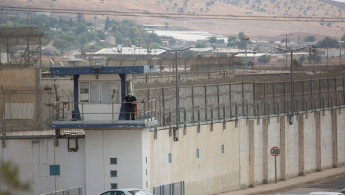Four Palestinians continue hunger strike against Israeli detention without charge, trial
Four Palestinians held by Israel under administrative detention without charge or trial remain on hunger strike against their continued detention, Palestinian news agency Wafa reported on Saturday.
The Palestinian Authority's news agency named the detainees as 34-year-old Kayed al-Fasfous and Sultan Khlouf, who have been on hunger strike for 31 days, along 24-year-old Iyad Baraqa and Maher al-Akhras, who have been on strike for 24 days and 11 days, respectively.
Israel is holding at least 1,201 Palestinians under administrative detention without charge or trial – the highest number since human rights groups began collecting monthly data in 2001, according to Israeli Prison Service data obtained by rights group HaMoked.
The country is also facing a prison overcrowding crisis, with its current prison population of 16,279 being in excess of the standard of 14,500 set by the Knesset's Interior Committee.
On Friday, a law that was set to come into effect to allow for the early release of prisoners to ease overcrowding was altered by a bill supported by far-right National Security Minister Itamar Ben-Gvir. The changes meant that prisoners held on "security" grounds - the majority of whom are Palestinian - would remain in detention.
Only 120 of around 1,500 prisoners were released on Friday.
There are 5,100 Palestinians jailed by Israel, with 1,200 held in "administrative detention", figures from prisoners' rights group Addameer show.
Administrative detainees have neither been charged with a crime nor granted a trial, and they and their lawyers are prevented from seeing evidence against them.
The detention orders typically last between three to six months and can be renewed indefinitely.





 Follow the Middle East's top stories in English at The New Arab on Google News
Follow the Middle East's top stories in English at The New Arab on Google News
![The UAE is widely suspected of arming the RSF militia [Getty]](/sites/default/files/styles/image_330x185/public/2024-11/GettyImages-472529908.jpg?h=69f2b9d0&itok=Yauw3YTG)
![Netanyahu furiously denounced the ICC [Getty]](/sites/default/files/styles/image_330x185/public/2024-11/GettyImages-2169352575.jpg?h=199d8c1f&itok=-vRiruf5)
![Both Hamas and the Palestinian Authority welcomed the ICC arrest warrants [Getty]](/sites/default/files/styles/image_330x185/public/2024-11/GettyImages-2178351173.jpg?h=199d8c1f&itok=TV858iVg)